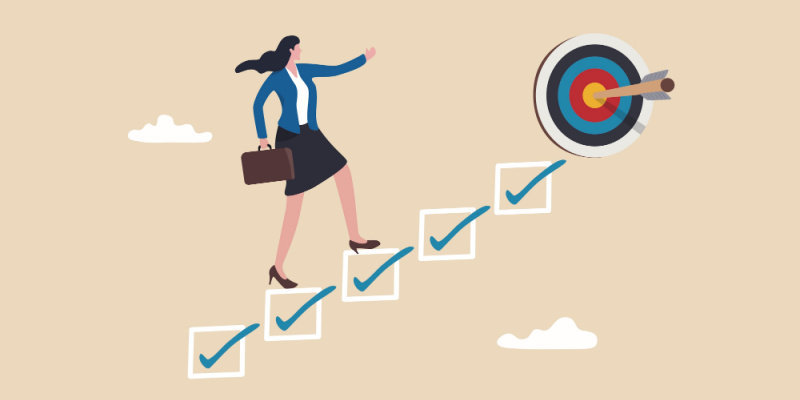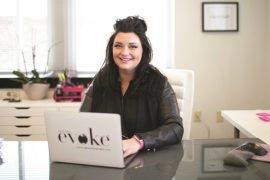By Katy Macek |
In the 1990s, Ann Imig was a struggling actor in Chicago. A random interaction introduced her to the idea of hiring a career coach, and she booked an appointment.
Almost 30 years later, her coach has helped guide her through four career transitions, including a pandemic-related career change.
“She helped with exploration and clarity,” Imig says. “Those are things that coaching is so powerful for, no matter what you’re working on.”
Imig opened her own virtual practice, Listen Life Coaching, in 2021 and now hopes to build those relationships with her clients.
Career coaches offer encouragement and accountability, says Katie Drescher, a Madison-based career coach.
“Many times we have information and know what we need to do, but we have blind spots,” Drescher says. “Coaching helps people move beyond those and have greater awareness so they can clarify goals, better understand and leverage strengths, find greater meaning and purpose, and provide a framework for action steps and accountability … to celebrate success and learning when things don’t go as planned.”
WHAT DOES A CAREER COACH DO?
Mary Michaud worked with Drescher for six months at the end of 2020 into 2021, helping Michaud decide whether the full-time position she has now at UW-Madison was even worth applying for.
“You can spin that around in your head, but it bumps up against all the beliefs that, in coaching, they say no longer serve you,” Michaud says. “Katie offers a well-trained eye to pick out when those are popping up and can call you [out] on them — in a very kind way.”
Michaud says their sessions inspired insights beyond what would come up in casual conversations with friends and family, partly because they are often influenced with that person’s experiences.
“It seems like a luxury, but it shouldn’t be, to have someone entirely focused and thinking really hard about you,” Michaud says.
Another advantage of working with a coach is access to evidence-based tools and resources, including assessments and guidance they can offer to help clients understand how to more deeply connect to purpose and meaning in work and life.
Sabrina Madison founded the Progress Center for Black Women in Madison for that very reason — to give Black women a resource to help them find success and joy in their work.
“Our vision [is] to create a Madison community where Black women proliferate as powerful CEOs, owners of local shops and leaders in their own right,” explains Madison.
The center holds conferences and workshops, but Madison says women often reach out to her for one-on-one sessions on career improvement strategies. This fall, Madison will offer monthly coaching sessions with herself and other professionals of color in the human resources field through Ambition, a nine-month accelerator program put on by the Progress Center for Black Women. The curriculum was devel- oped with UW Extension Dane County. (Women don’t have to be in the Ambition program to sign up for coaching sessions).
WHEN TO HIRE A COACH
A coach can help you transition to a new role, find wellbeing in a current role or improve performance, Drescher says. People also come to her when they are looking to find more meaning in their work or make more of an impact.
For any woman, but Black women in particular, job stagnation or burnout can lead to mental and physical health issues. Madison says oftentimes, women don’t approach her for career advice until they’ve hit their limit.
“Most of the time, these women are at this exhaustion point,” she says. “It does weigh on your mental health … and other [health] issues you don’t even realize [that] are related to your job.”
WHAT DO COACHING SESSIONS LOOK LIKE?
Imig worked with her career coach on and off for more than 20 years, coming back to her whenever she found herself in a transitional period.
The timeline depends on the person and the initial need for coaching, but Drescher says that generally only a few months are needed to have a lasting impact.
She structures her services in three- or six-month packages, meeting twice a month.
“I’ve found that length of time is how long it takes for someone to get clear on what they want and then dig in on examining values, barriers, strengths and networks,” she says. “And then taking action and getting ongoing support for maintaining the progress they’ve made.”
Costs vary depending on the coach and number of sessions. Drescher charges $3,000 for a six-month package, or 12 sessions.
Imig offers pay-as-you-go, 30-minute “Laser Sessions” for $100 per session with email support between sessions. (She notes the first session with her is free.) She also offers pack- aged sessions ranging from $600 to $1,600 for four, eight or 12 sessions.
HOW TO SELECT A COACH
Most coaches offer a free 30-minute consultation or “discovery call,” and Imig says to take advantage of those. It may take several appointments with different coaches to find the best fit.
“This is going to get vulnerable, and you’re probably going to want to walk away at some points,” she says. “You want someone you can trust and who is going to be energetic and positive.”
She also suggests doing research. Review the coach’s website and read reviews. While certification is not required, Imig says many coaches have some training. She has her masters in social work from the University of Chicago and is also a certified positive psychology coach and a mental fitness coach as well.
Drescher, who not only has a JD from Washington University School of Law and a BA from Lawrence University in conscious business and positive psychology, also has a certificate in professional coaching from UW-Madison, which offers an International Coaching Federation (ICF)-accredited program. She’s also a member of ICF.
The choice comes down to personal preference, which Madison says can be even more important for Black women and women of color.
“I can go to any number of white women in my network, but [they] cannot tell me how to approach my situation as a Black woman,” she says. “You want somebody who has walked in your shoes and has shared experiences.”




